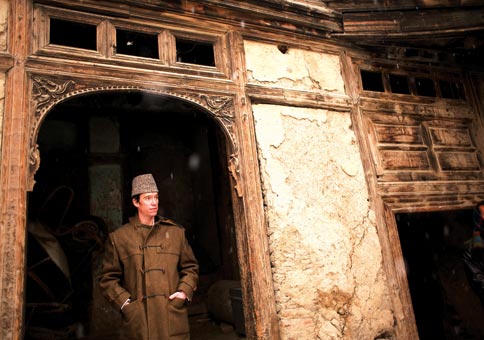Rory Stewart Walked Through Afghanistan
I just finished The Places in Between, a book by Briton Rory Stewart about his walk through Afghanistan in the winter of 2002, right after the invasion of Afghanistan by the Northern Alliance and the capture of the Taliban. This is probably one of the most amazing things I have ever read about.
Stewart, originally a career diplomat with the British Foreign Service, felt something missing in his life, quit his prominent career, and decided to walk around the world. Unfortunately, he only got as far as walking through Iran, Afghanistan, Pakistan, India, and Nepal. Bummer. In the book, he chronicles how he walked the 400 or so miles from Herat to Kabul in about a month by heading through the unknown central lands of Afghanistan without carrying a detailed map because “it made him look like a spy.”
There are some people who are not content to live normal lives, eat breakfast with a paper, go to work, and catch up with friends at Starbucks. In the tradition of those like Lawrence, who throw off the warm, routine comforts of the West, Rory Stewart is one of these people. However, this intensely strong part of his character is not completely evident in the book, where he tries to distance the reader as much from him as possible to focus on describing Afghanistan as it was after the fall of the Taliban just as his predecessor, the Mughal emperor [
I just finished The Places in Between, a book by Briton Rory Stewart about his walk through Afghanistan in the winter of 2002, right after the invasion of Afghanistan by the Northern Alliance and the capture of the Taliban. This is probably one of the most amazing things I have ever read about.
Stewart, originally a career diplomat with the British Foreign Service, felt something missing in his life, quit his prominent career, and decided to walk around the world. Unfortunately, he only got as far as walking through Iran, Afghanistan, Pakistan, India, and Nepal. Bummer. In the book, he chronicles how he walked the 400 or so miles from Herat to Kabul in about a month by heading through the unknown central lands of Afghanistan without carrying a detailed map because “it made him look like a spy.”
There are some people who are not content to live normal lives, eat breakfast with a paper, go to work, and catch up with friends at Starbucks. In the tradition of those like Lawrence, who throw off the warm, routine comforts of the West, Rory Stewart is one of these people. However, this intensely strong part of his character is not completely evident in the book, where he tries to distance the reader as much from him as possible to focus on describing Afghanistan as it was after the fall of the Taliban just as his predecessor, the Mughal emperor](http://en.wikipedia.org/wiki/Babur) did when he took the same route centuries ago. I learned oodles about Afghanistan that I didn’t know before from my precursory reading of The Kite Runner, The Bookseller of Kabul, watching the movie Osama, and loading up on old Soviet films of the invasion of Afghanistan.
If I could, I would give this book a standing ovation for the worlds it opened for me as much as for the author’s bravery and cultural sensitivity, as well as recommendations of how aid agencies should handle Afghanistan.
As he walks, he describes the landscape of Afghanistan, the cultural history of the country, and the simple village people who have no concept of what the World Trade Center towers were and how they impact the fighting in their country. It is such a fascinating read, simply because we will never have access to that world, to Afghanistan, where everything comes to a crux between three continents over millennia, and we will never be able to just pick up and go across a warzone with just a pack on our backs, particularly not with the ease of a man who has few attachments and little to lose. I strongly suspect that the author was on heavy self-administered doses of crack cocaine when he decided to undertake this trip. After his stint in Asia, Stewart also was a governor of a province in Iraq for a year after the American invasion.
Having completed his stints in the hippest new vacation spots for the American army, Stewart started a foundation to revive the Old City of Kabul and became immediately in demand as an analyst of the situation on the ground for Afghanistan. There are some who critique him for his current role in the resurrection of Afghanistan, but I will most definitely take his advice over others’, given his experience in the mountains of central Afghanistan in the winter.
Related on the blog:

